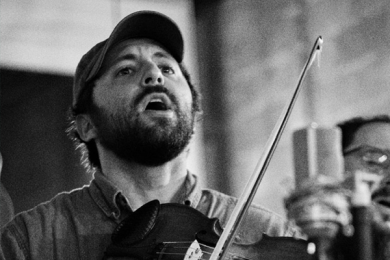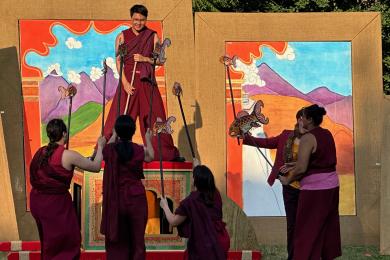All Over the World
News
Youth In Return
If you've been following this blog lately, you might be getting the impression that it's all just doom and gloom for the future of theater as we know it. I'll admit, there's not much that I've found out there in the news that gives much hope for anything other than the Broadway-Industrial Complex.
However, TicketMaster (normally cast as the villain in any piece about the arts) recently released a report that shows actual glimmers of hope on the horizon. young people are more likely to be at the theater. The age groups between 16 and 25 are buying more tickets to shows than any other group, and their attendance has actually being growing drastically (up 71% over the last five years).
What's more, these young audiences are showing a taste for new work. Audiences are more likely to buy tickets to brand new work (or relatively new established works) than to long-running classics like the favorites listed above, and significant portion are interested in experimental and immersive pieces.
Granted, this information is only for the United Kingdom, which already has high theater attendance overall, and TicketMaster hasn't done any surveys of its American customers; but these are good trends. As the preface to the full report says, "The theatre world has been insecure about its future for years now, but our report shows there is little reason to be cautious."
Meanwhile, Also in Britain
So, there's hope! All you aspiring recent high school graduates should run out and enroll in a college theater program so that you can learn to be a highly-paid actor who becomes a star, instead of getting that MBA so that you can learn to be a highly-paid CEO who helps crash our economy on the next go-round.
Except, that may all be a bunch of hooey. The head of the National Youth Theatre in the UK, Paul Roseby, boiled up a fresh cup of controversy recently by commenting at an event, "Drama schools are incredibly expensive and the majority of actors don't need three years' training… You don't need to learn how to act, you need to learn how to sell yourself. You can either act or you can't."
He went on to clarify these statements with reasonable observations that current college programs don't do enough to teach students the hard arts of marketing themselves and that actors instead could focus on modular training in specific areas where they feel they need it, but his pragmatic and nuanced comments were boiled down to "College is a waste of time!" in the media conversation.
Of course, critics have been coming out of the woodwork in defense of the country's drama programs. However, in the midst of all the outcry, many of them begrudgingly admit that he's kind of got a point.
Go East, Young Man
So, forget Britain, then. Let's look somewhere else for your fortune! Why not head into the second-largest economy in the world, a country that is rapidly consuming as much Western culture as they can get their hands on? The appetite for musical theatre imports from the US and the UK how it does and does not work.
We've been watching TV for over six decades, and we're constantly told that it's helping to strangle theater. Jonathan Mandell at HowlRound wants you to know that there are lovely things that theater can learn from TV to make itself better.
And, finally, something that's near and dear to my heart. As a former professional puppeteer and current creator of spontaneous puppet shows with condiments and forks at restaurants, I always say that puppets have a lot to teach to actors. Chris Jones at the Chicago Tribune learned a few things from a puppet show that are applicable to all things theatrical, whether the performers are flesh and blood or cardboard and cloth.
What Do We Do With All This Stuff?
Good question! What are we supposed to do with all this training, theory and philosophizing? Is it all just so we can sing and dance our little hearts out for people paying a hundred bucks a pop for a little escapism? Or can we do something more?
Before I leave this week, I'd like to bring us back home here to the Twin Cities to highlight a group that's trying to do that "something more" portion of the previous query. Footprints Collective, a group of local artists who do plenty of other work on their own, have come together to help create new works out of the true stories of a community.
[Full disclosure: Alan Berks, the founder of Minnesota Playlist, is a part of this company; but, trust me, he doesn't pay me enough to shill for anything if I'm not truthfully interested in it.]
Footprints has been working for a while on The Veterans Play Project, which uses the actual stories of Minnesota military veterans to give voice to their community. If you're a regular theatre-goer in the Twin Cities, you'll probably recognize some of the names attached to this project: Leah Cooper, Maren Ward, Tamera Ober, John Bueche; but the bigger, better of the story is that 13 of the 20 actors and musicians in the play are themselves veterans or active duty military and will be performing at Fort Snelling. They'll be telling a complicated, multi-faceted story with viewpoints from all sides using the people who are most qualified to tell the story.
The Short Halloween Addendum
And, if you're still hungry for pure spectacle after that, go to the BareBones Halloween Show. I don't care how cold it is. Seriously. Just get a flask of whiskey and a scarf and do it.




